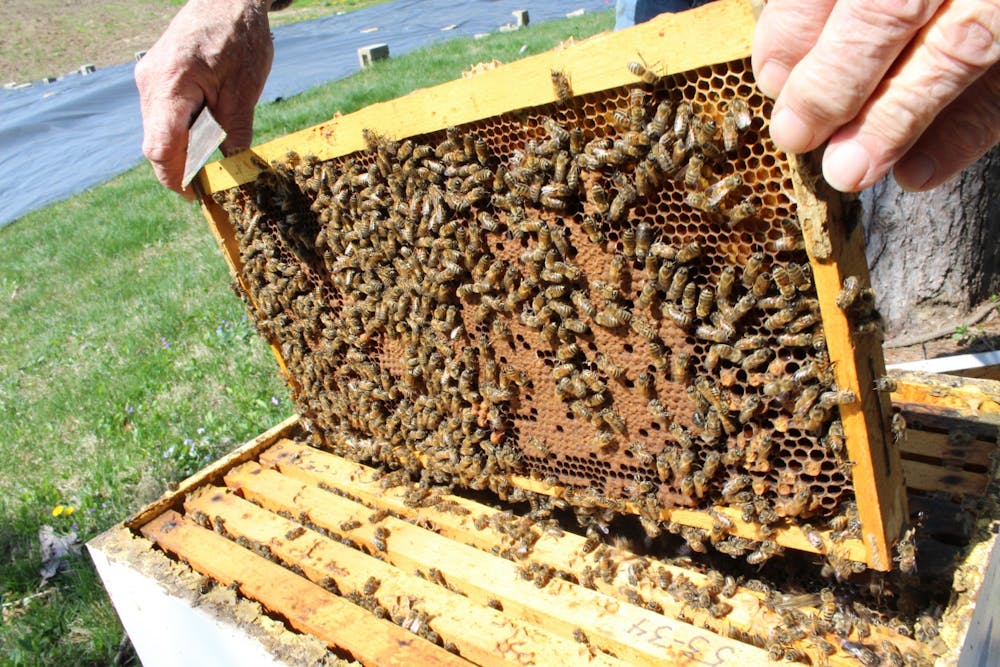IU researchers concluded that Bombella apis, a microbe supplemented to honey bee larvae, plays a large role in the health of a colony.
Honey bee larvae get food and nutrients from sister bees who provide nectar, pollen and a substance called royal jelly. This is a nutrient-rich secretion that honey bees raised to be queens consume their whole lives. Other bees eat nectar and pollen within a few days. Bombella apis is the only known bacterium able to survive in the royal jelly and provides much more nutrition through amino acids.
It chemically produces all essential amino acids including lysine in the larvae’s diet, the researchers said in their published work.
B. apis supports the honey bee development and transition into functioning worker bees. This positively impacts the honey bee colony's health and hive strength.
Irene Newton, one of the researchers, said to IU News that when they added the microbe to the bees, the bees grew to the same mass compared to control bees with full nutrition. In their experiments, B. apis compensated for the poorer diet and could potentially be added to the colonies as a probiotic and protective measure.
“It’s really important that we discover that the symbiont bolsters nutrition under stress,” Newton said. “Nutrition impacts bees and their ability to keep the numbers up and have populations increase.”
Because honey bees play a large role in the pollination process of several crops, when farmers grow monoculture crops like corn and soybeans, they’re reducing the diversity of flowers that honey bees and other pollinators can visit, Newton said.
She said nutrient loss leads to a decline in the honey bee population, but that it can derive from a combination of different stressors. These can include pests and parasites, pathogens like viruses and exposure to toxic chemicals from pesticides and herbicides.
Ethan Mitchell, a member of The Beekeepers of Indiana, said mites were problematic on his honey bee farm.
“They transmit viruses and stuff to the bees that weaken the hive and eventually make the queen sick,” Mitchell said. “Once the queen is sick, the colony fails.”
He also said when farmers use insecticides, the bees bring the chemicals back to the hive. Farmers can potentially lose 30 pounds of honey.
Ellie Symes, CEO of The Bee Corp and IU alumni since 2018, said unstable bee populations can prevent bees from being able to pollinate the same crop yield repeatedly.
The Bee Corp is an Indianapolis-based startup that uses technology to maximize pollination levels.
“I think innovations like what the lab is working on are excellent because we don’t have a lot of natural forage out there for honey bees anymore,” Symes said.
She said she agrees that the research Newton and others were doing could be used in nutrition products. Eventually beekeepers could use it in order to combat problems like the varroa mite.
“By improving the gut health of the honey bee, it should make a more disease-resistant population,” Symes said.
While at IU, Symes founded and led the Beekeeping Club, a group of students who wanted to manage beehives. They started a university program using university funds to manage the land around the hilltop gardens for pollinator gardens and similar projects.
It helped serve as the basis of The Bee Corp, she said. Here, with a grading system called Verifli, they assess hive strengths and population levels for beekeepers.
Symes explained it’s a non-invasive method to inspect hives and count bees needed for crop pollination.
She said she looks forward to other research the IU labs are doing concerning Bombella apis. In the published research, Newton and others said they would be looking into other strains that can also provide the larvae with nutrients and development.




